Choosing the right flooring can transform your living space, but with so many options available, making a decision feels like navigating a design maze. Hybrid flooring and vinyl planks have emerged as top contenders for modern homeowners seeking durability, style, and affordability.
This comprehensive guide will break down the key differences, helping you make an informed choice that perfectly suits your home’s unique needs.
What Are Hybrid and Vinyl Floors?
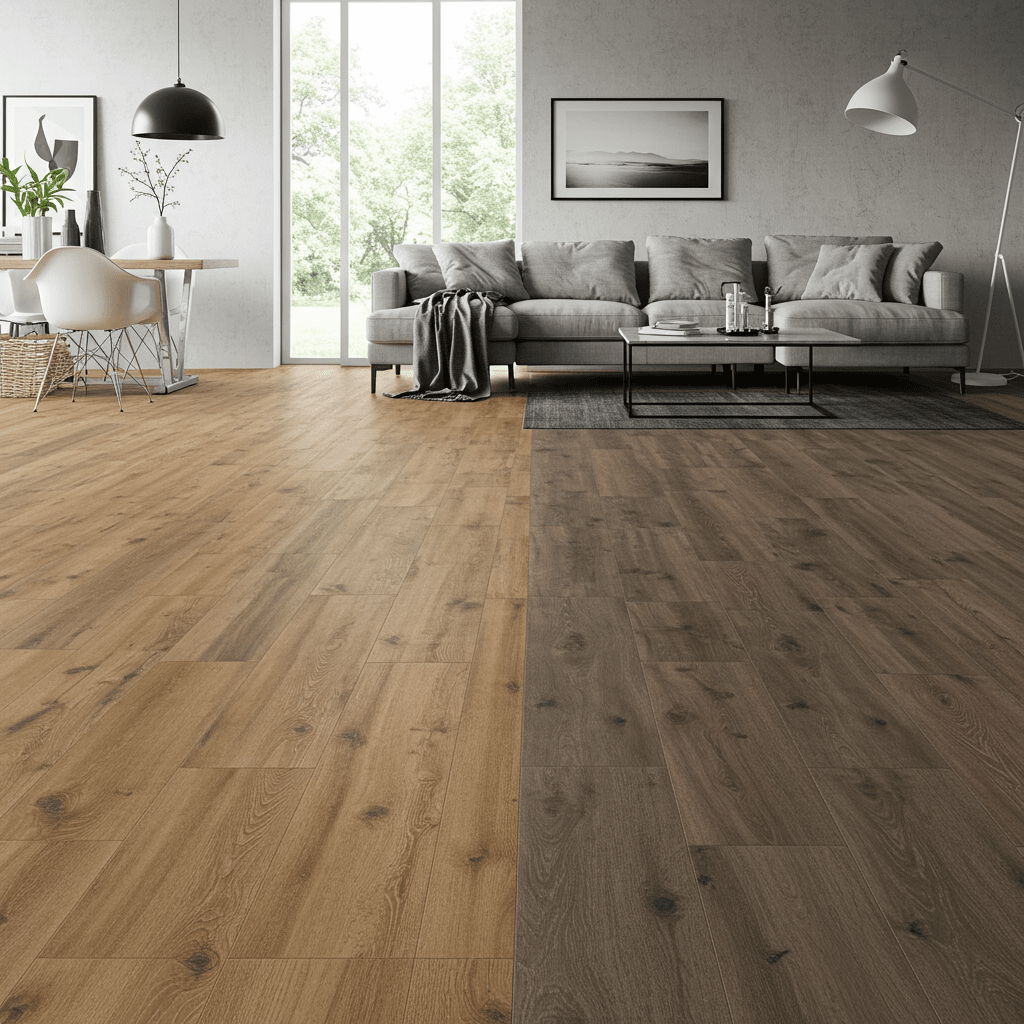
Choosing the right flooring for your home can be overwhelming, especially with so many modern flooring options available today.
Two standout choices are hybrid flooring and luxury vinyl planks, both of which offer durable floor solutions ideal for contemporary home designs. Here’s a breakdown of each type to help you make an informed decision.
Hybrid Flooring 101
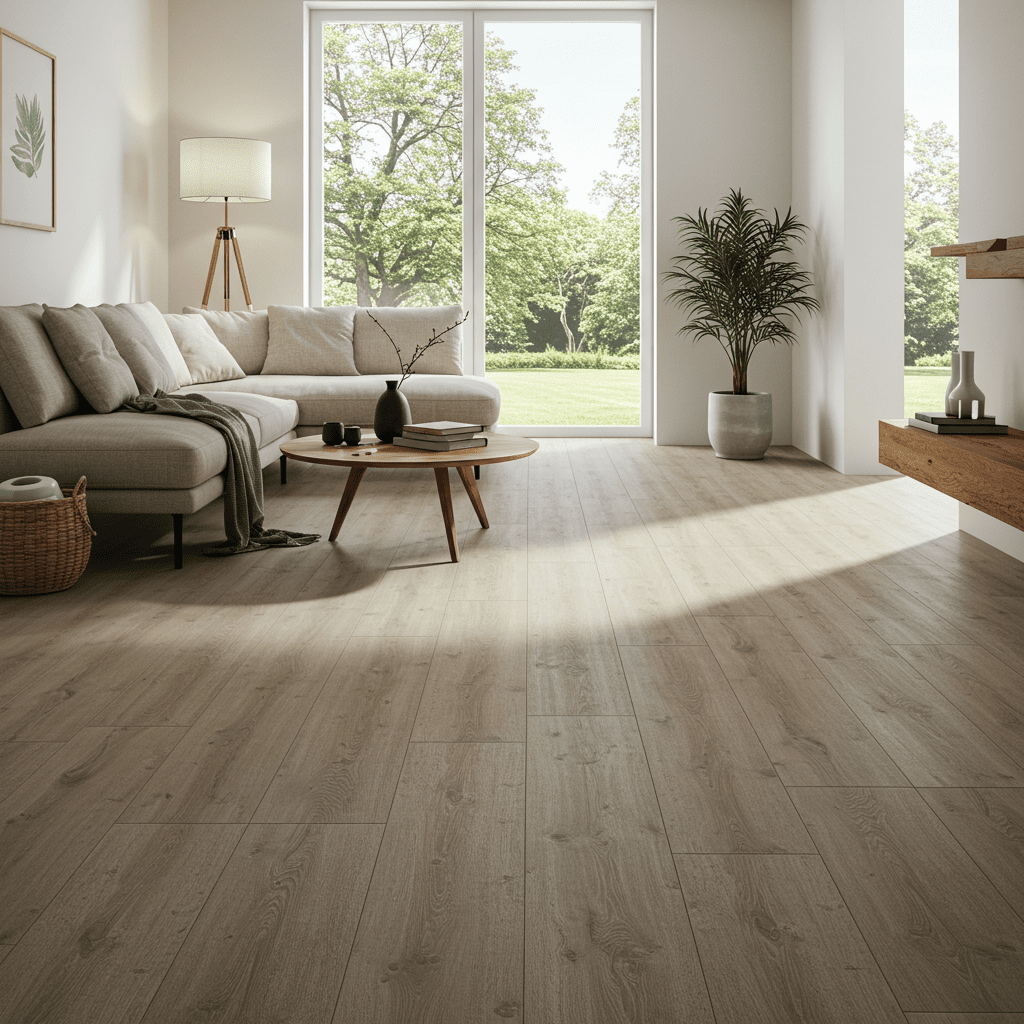
Hybrid flooring is a cutting-edge option born from advanced hybrid floor technology, blending the best features of laminate and vinyl floors. Its key composition includes a rigid core layer designed for stability, combined with layers that mimic the look and feel of natural wood or stone.
This flooring type is highly resistant to scratches, dents, and water, making it a popular choice for areas prone to spills or moisture, like kitchens and bathrooms. Its waterproof flooring capabilities provide long-lasting durability while maintaining aesthetic appeal.
Designed to handle the challenges of modern living, hybrid floors are often considered a top pick among home renovation materials.
Vinyl Planks
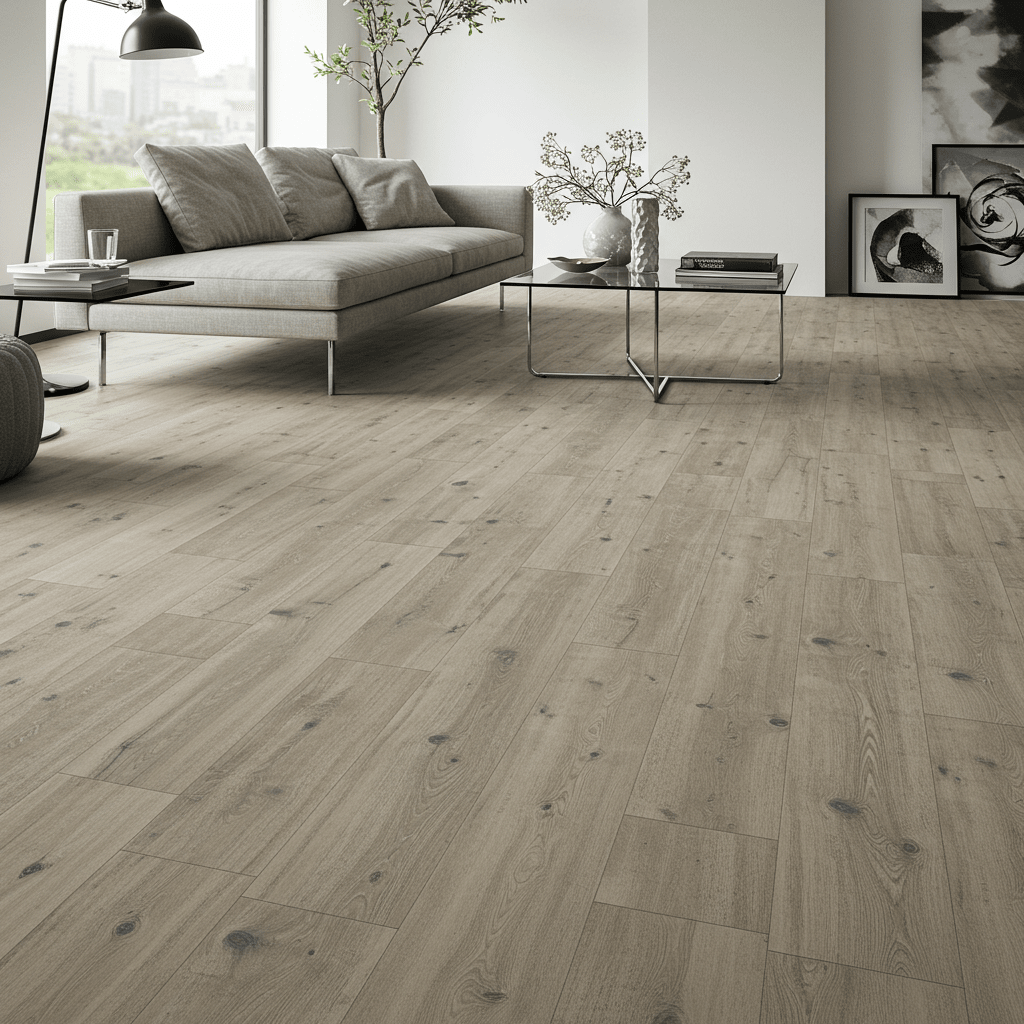
Luxury vinyl planks (LVP) are crafted to replicate the look of hardwood floors, offering a sleek, high-end finish. Made from layered PVC materials during the manufacturing process, they deliver exceptional durable floor solutions that stand up to heavy foot traffic with ease.
A standout feature of LVP is its versatility; it’s available in a variety of styles, textures, and colors to suit virtually any design aesthetic.
Vinyl planks, like hybrid flooring, are also water-resistant some options even classify as waterproof flooring making them ideal for bathrooms, laundry rooms, and other moisture-prone spaces.
Thanks to their affordability and adaptability, LVP remains one of the most sought-after home renovation materials for residential projects.
Key Composition Differences
While both flooring types prioritize durability and water resistance, their main distinction lies in their construction:
- Hybrid flooring merges laminate and vinyl technologies, offering a stiffer core for extra resilience.
- Vinyl planks, on the other hand, are made entirely of PVC, prioritizing flexibility and customization.
Understanding these differences can help homeowners compare residential floor options and choose the perfect product for their lifestyle and design preferences.
Related Read: How To Get Water Stains Out Of Vinyl Flooring
Performance Comparison
When selecting flooring, understanding how different solutions perform under various conditions is crucial. Two major contenders hybrid flooring and luxury vinyl planks excel in durability, water resistance, and scratch resistance. Let’s dive deeper into their features to identify which performs best for specific ideal usage scenarios.
Water Resistance Showdown
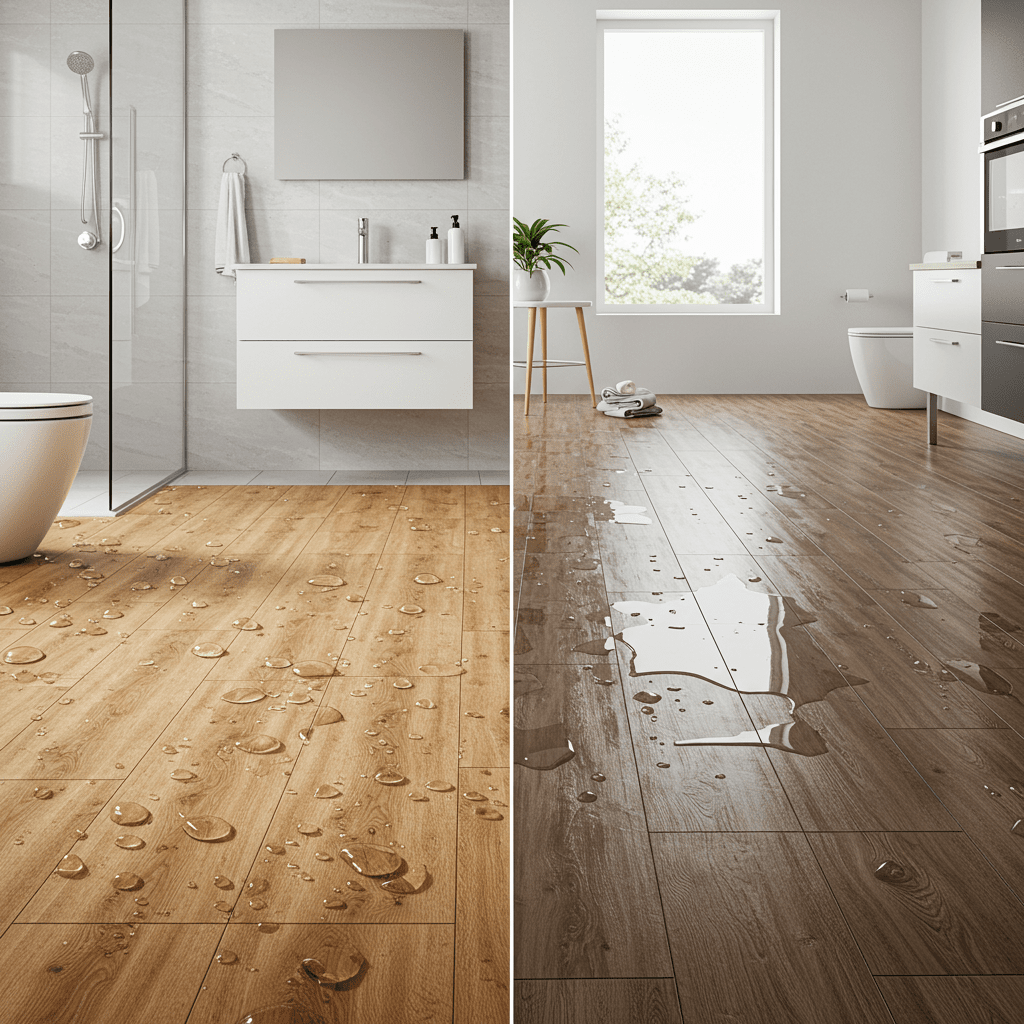
Water resistance is often a top consideration for modern flooring options. Both waterproof flooring varieties hybrid and vinyl are fantastic choices for spaces prone to spills or humidity, such as kitchens, bathrooms, and basements.
However, hybrid flooring takes water resistance to the next level with its rigid core layer and heat-pressed protective surfaces, making it completely waterproof and immune to swelling or warping.
In contrast, luxury vinyl planks offer strong water resistance but may require adhesive or locking mechanisms to remain fully watertight over time.
Pro Tip: For areas with standing water risks, hybrid floors often provide superior protection.
Durability and Wear Layers
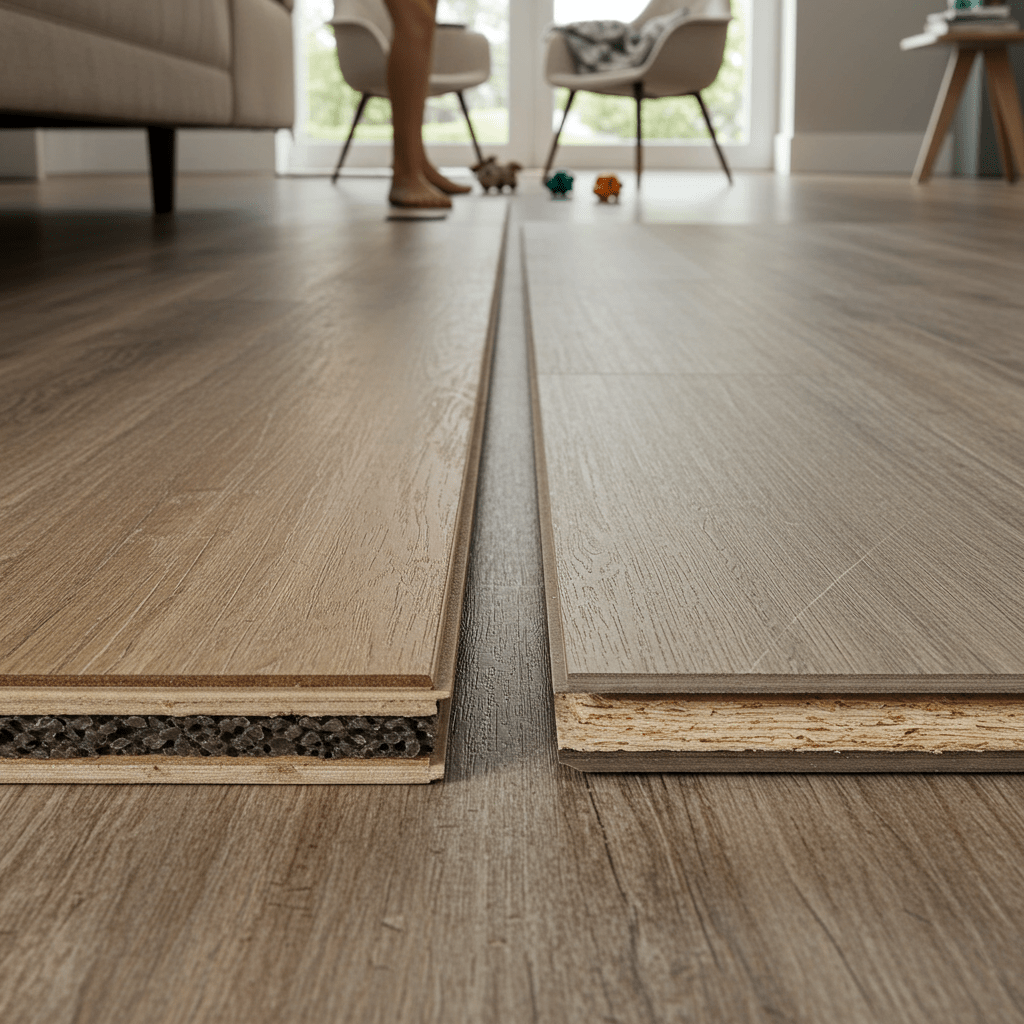
When it comes to durable floor solutions, wear layers play a significant role. Hybrid floors are designed with thicker wear layers than luxury vinyl planks, enhancing their ability to withstand pressure, heavy furniture, and high-traffic areas.
This makes hybrid flooring an excellent choice for homes with active families, pets, or frequently used rooms.
On the other hand, vinyl planks are less rigid, offering flexibility and comfort underfoot while still being robust enough to handle regular wear and tear. For tasks like home renovation materials selection, each option caters to specific needs based on activity levels.
Need floors for a busy home? Check out guide on durable materials for family spaces
Impact and Scratch Resistance
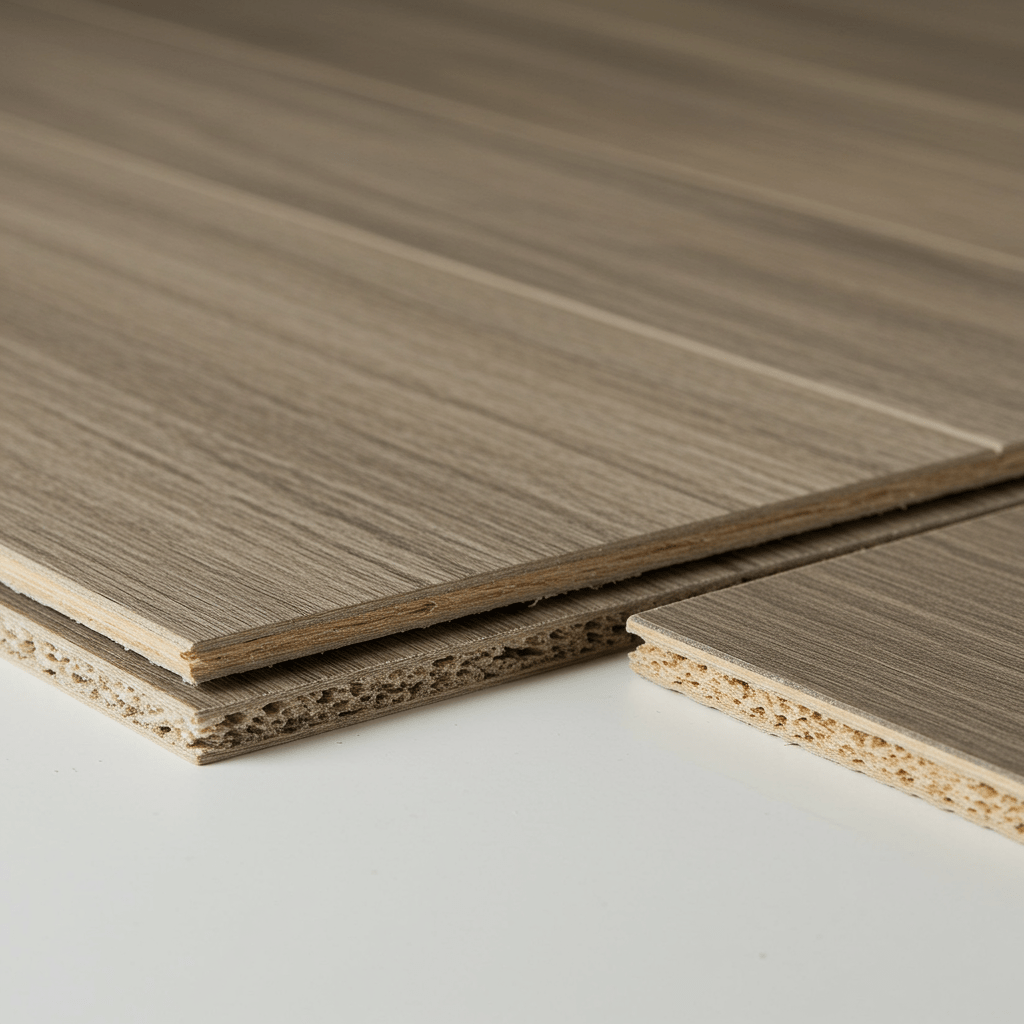
Flooring must withstand daily challenges, from accidental impacts to the wear caused by furniture or pet claws. In this regard, hybrid flooring often outperforms luxury vinyl planks, thanks to its harder core and hybrid floor technology, which boosts its resistance against scratches and dents.
Vinyl planks, while durable, are slightly softer, making them prone to minor scuffs over time. However, modern residential floor options often include enhanced top-coat technologies that improve scratch resistance for both flooring types.
Comparative Strength Tests:
- Hybrid floors excel in high-impact scenarios like dropped cookware or heavy furniture shifting.
- Vinyl planks are better suited for less aggressive environments, offering great usability for bedrooms and offices.
Ideal Usage Scenarios
To decide which flooring solution fits your lifestyle, consider your home environment:
- Hybrid flooring is ideal for homes with high traffic, pets, or areas prone to moisture.
- Luxury vinyl planks shine in stylish yet lower-impact zones, such as bedrooms or home offices.
For overall resilience and versatility, hybrids are perfect for large-scale home renovation materials, while vinyl planks remain a practical option for those seeking cost-effective yet elegant solutions.
Related Read: What To Look For When Buying Vinyl Plank Flooring
Cost Analysis and Value Proposition
When comparing flooring types, understanding the cost implications—both upfront and long-term—can help you determine the best option for your home and budget. Hybrid flooring and luxury vinyl planks each offer unique benefits in terms of cost-effectiveness factors and overall value.
Below, we’ll explore how these modern flooring solutions stack up in terms of installation, maintenance, and long-term financial impact.
Initial Installation Costs
The initial cost of installing home renovation materials like hybrid flooring and vinyl planks varies based on factors such as labor, material grade, and size of the project. On average:
Luxury vinyl planks are generally more affordable, with prices ranging from 2 to 2 to 5 per square foot for materials. Installation costs may vary, but they typically fall on the lower side due to the simpler manufacturing process.
Hybrid flooring, on the other hand, tends to cost slightly more upfront, averaging 5to5to7 per square foot for materials. Its higher price reflects its hybrid floor technology, which combines durable components for added resilience and waterproof features.
While vinyl offers a more budget-friendly option for smaller renovations, hybrid floors can prove worthwhile for homeowners seeking modern flooring options that will last longer in high-traffic or moisture-prone areas.
Long-Term Maintenance Expenses
In terms of durable floor solutions, the long-term costs associated with maintaining hybrid flooring and vinyl planks can make a significant difference in their overall value. Both flooring types are designed to resist common wear and tear, but here’s how they compare:
Hybrid flooring requires minimal maintenance thanks to its fully waterproof design and scratch-resistant surface. Occasional cleaning and protective measures (e.g., furniture pads) are typically all that’s needed to keep it looking new.
Luxury vinyl planks, while durable, may involve slightly higher maintenance costs, especially if adhesive-based installation results in loosening over time in moist environments. However, vinyl’s flexible material is easy to repair or replace compared to its hybrid counterpart.
Learn more about how to maintain waterproof flooring in our practical care guide.
Return on Investment
When considering the price range comparisons and potential resale value, hybrid flooring tends to offer a higher return on investment in the long run.
Its durability and waterproof flooring capabilities make it a desirable feature for future homebuyers especially in homes located in areas with varying weather conditions.
For smaller budgets, luxury vinyl planks remain a solid value proposition thanks to their affordability and ability to mimic high-end materials like hardwood.
While they might not have the same built-in longevity as hybrid floors, their visual appeal and reasonable price point ensure they’re still a cost-effective choice for residential floor options.
Suggested Cost Breakdown:
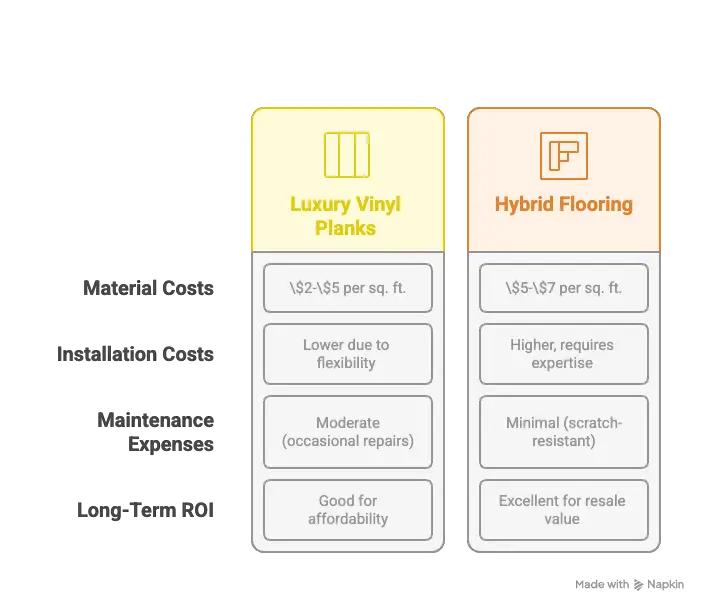
Cost-Effectiveness Takeaway
Ultimately, both hybrid and vinyl flooring options offer cost-effectiveness factors tailored to different needs:
- Choose luxury vinyl planks for lower upfront costs and aesthetic flexibility.
- Opt for hybrid flooring for better durability, water resistance, and long-term investment value.
Related Read: Repairing Vinyl Plank Flooring: DIY Guide
Design and Aesthetic Considerations
Flooring doesn’t just provide functionality—it’s a major contributor to your home’s overall aesthetic. Both luxury vinyl planks and hybrid flooring shine when it comes to versatility, offering modern flooring options tailored to every homeowner’s design preferences.
Below, we dive into their visual appeal comparisons, customization potential, and ability to incorporate the latest trends.
Style and Color Options
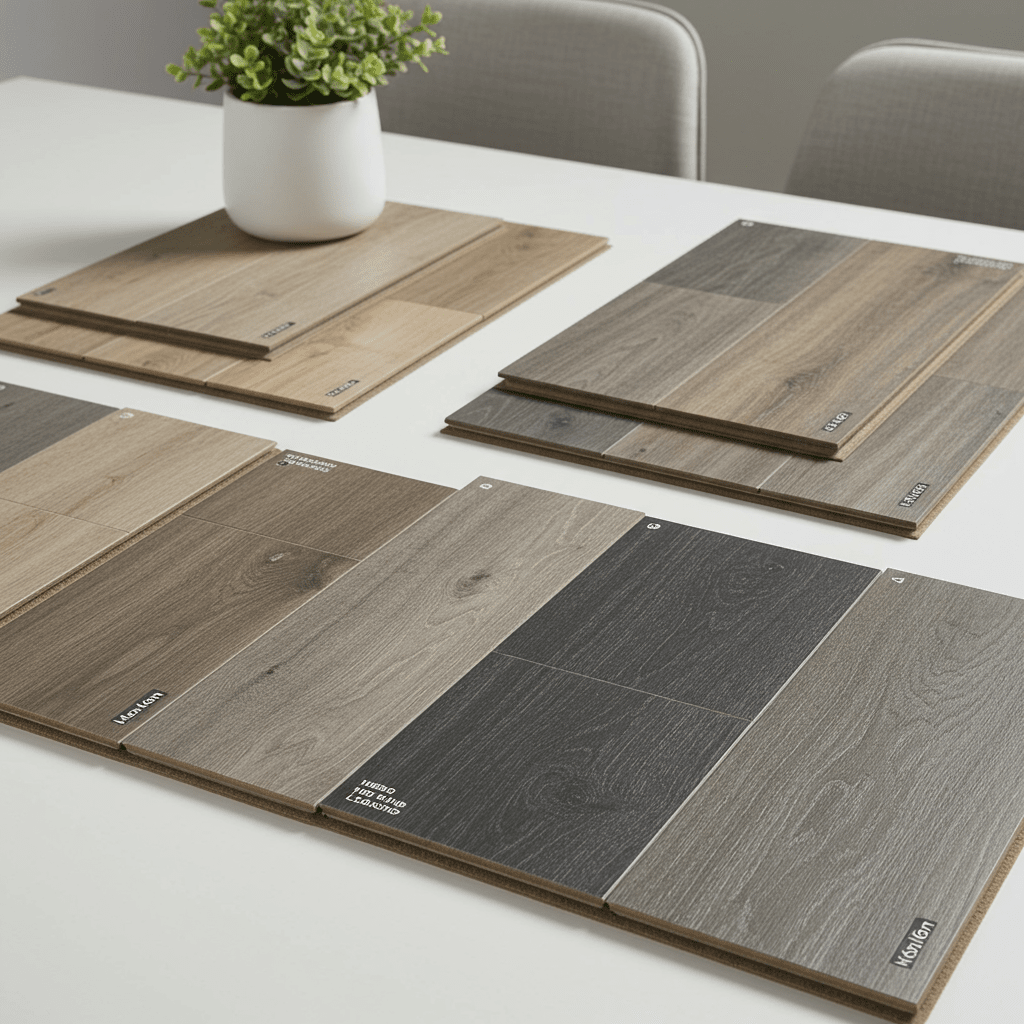
One of the standout features of both flooring types is their wide range of style and color options. Manufacturers have focused on offering diverse designs to suit various tastes, ensuring homeowners can find options that complement any interior aesthetic.
Luxury vinyl planks are available in countless colors, from warm woods to cool, contemporary grays, mimicking natural finishes at an affordable price. With options ranging from rustic to modern, vinyl provides the freedom to match flooring to specific themes in home renovation materials.
Hybrid flooring, while slightly more limited in variety, excels in providing richly detailed designs that closely resemble natural wood and stone. Its durable floor solutions include enhanced visuals that remain consistent over time, even in high-traffic or moisture-heavy areas.
Realistic Texture Mimicry
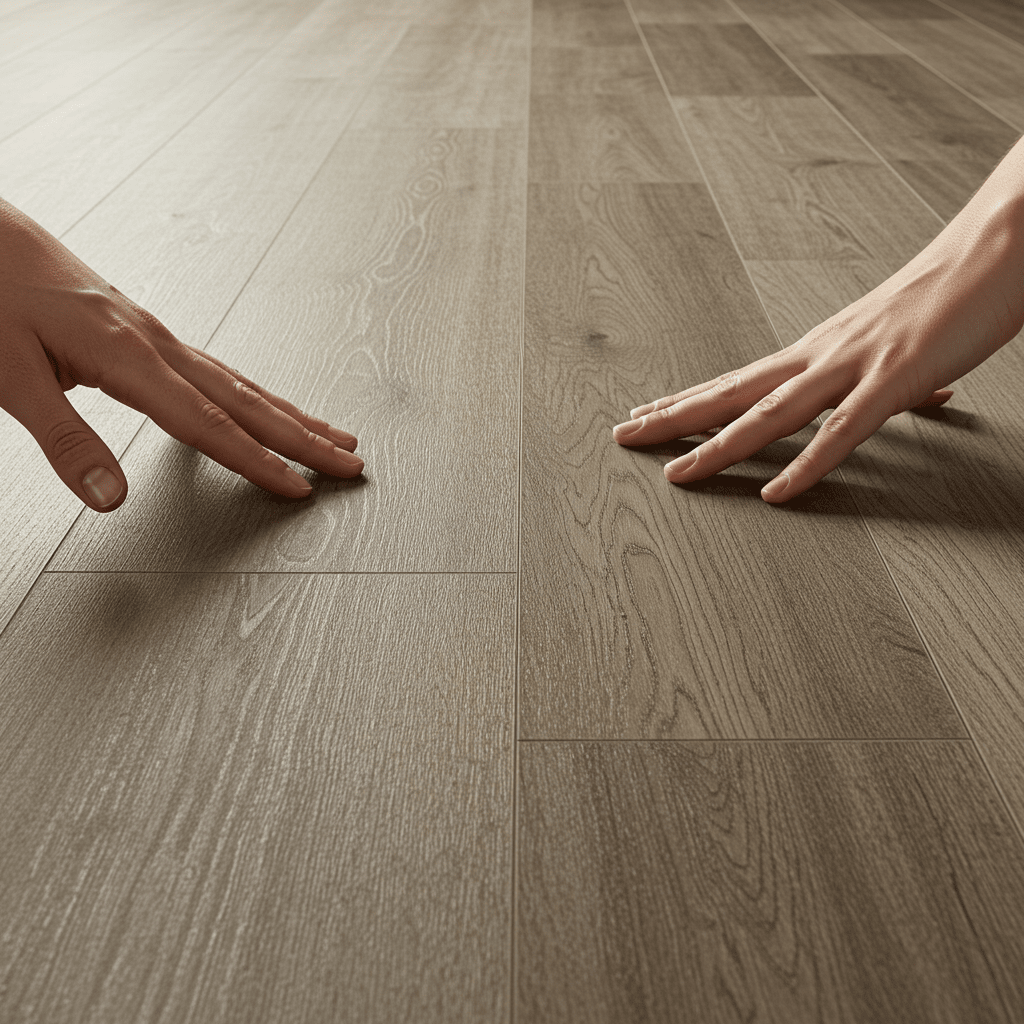
When it comes to realistic texture mimicry, both flooring options deliver, but there’s a slight difference in how they achieve it:
Luxury vinyl planks use embossed textures that not only look but also feel like authentic hardwood, providing depth and realism at a fraction of the cost. Advanced techniques even capture subtle grain patterns for a lifelike finish.
Hybrid flooring takes texture realism up a notch, pairing intricate designs with hybrid floor technology that replicates wood or stone down to the details. Its slightly firmer structure provides a tactile authenticity, making it an excellent choice for homeowners seeking elegance and durability.
No matter the material, these features allow for stunning residential floor comparisons, ensuring your home’s flooring doesn’t compromise on visual appeal.
Modern Design Trends
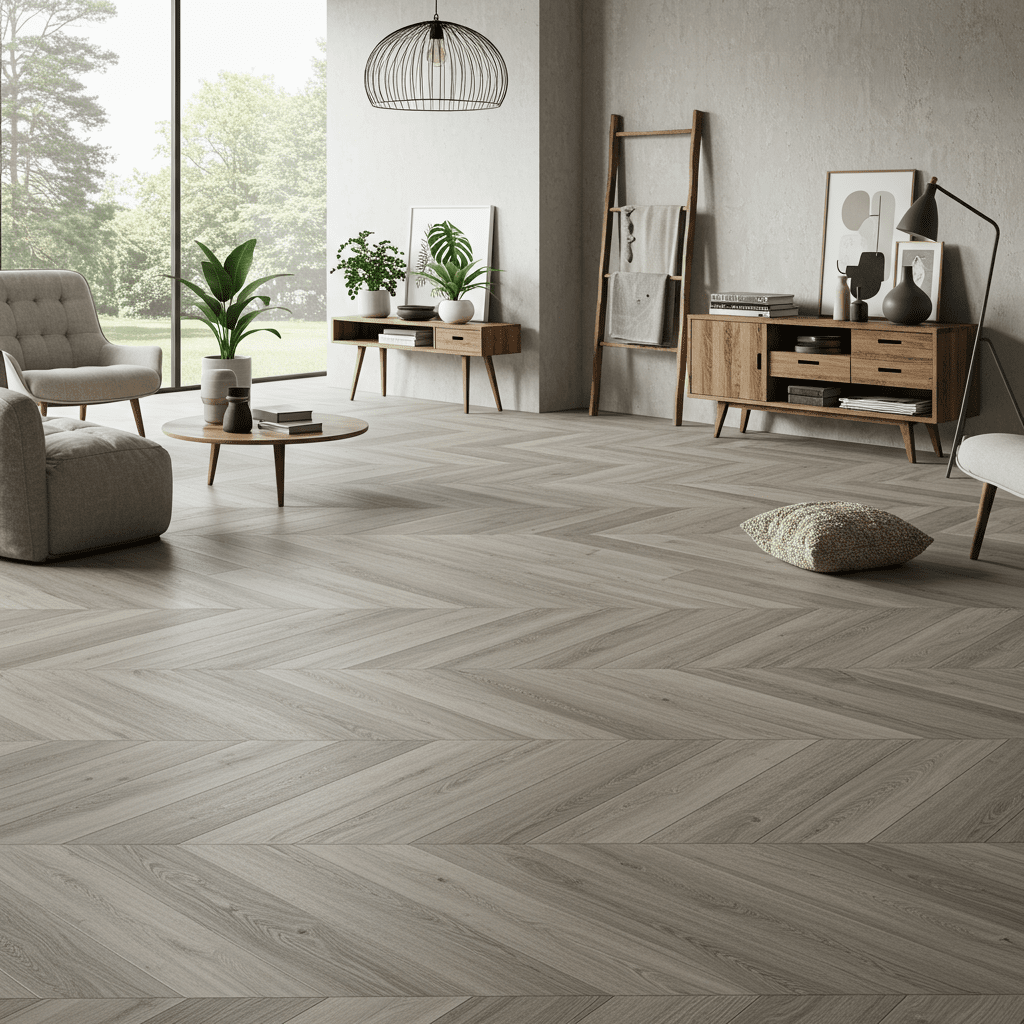
Flooring trends shift over time, and today’s preferences lean toward modern flooring options that combine beauty with functionality. Both hybrid and vinyl flooring have evolved to cater to emerging styles, including:
Neutral tones and minimalist designs that create a sleek, timeless aesthetic.
Bold, patterned planks that enable unique customization potential for homeowners looking to make a statement.
Versatile home renovation materials like hybrid and vinyl layers can complement trends such as open-concept living spaces or sustainable designs.
Whether you prefer the subtle sophistication of natural-looking textures or want to embrace modern trends, these flooring solutions offer endless design possibilities.
Visual Appeal Comparisons and Customization Highlights
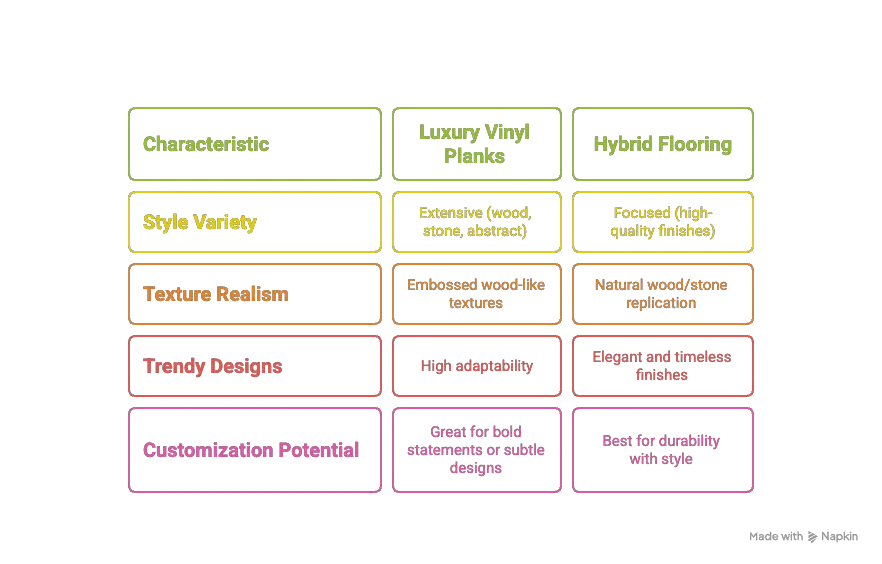
Customization Potential Takeaway
Both flooring types empower homeowners to personalize their spaces:
- Opt for luxury vinyl planks if you’re looking for bold colors and endless varieties to suit a wide range of themes.
- Choose hybrid flooring if realism, elegance, and lasting durability are key priorities for your space.
For the best of both worlds, consider mixing these modern flooring options for different rooms, ensuring each space has its own functional and aesthetic charm.
Related Read: Changing Direction Of Vinyl Plank Flooring Between Rooms
Installation and Maintenance
Proper installation and upkeep can make all the difference in ensuring your flooring remains as functional and beautiful as the day you installed it. Whether you choose luxury vinyl planks or hybrid flooring, understanding installation methods and maintenance guidelines will help maximize longevity and visual appeal.
DIY vs Professional Installation
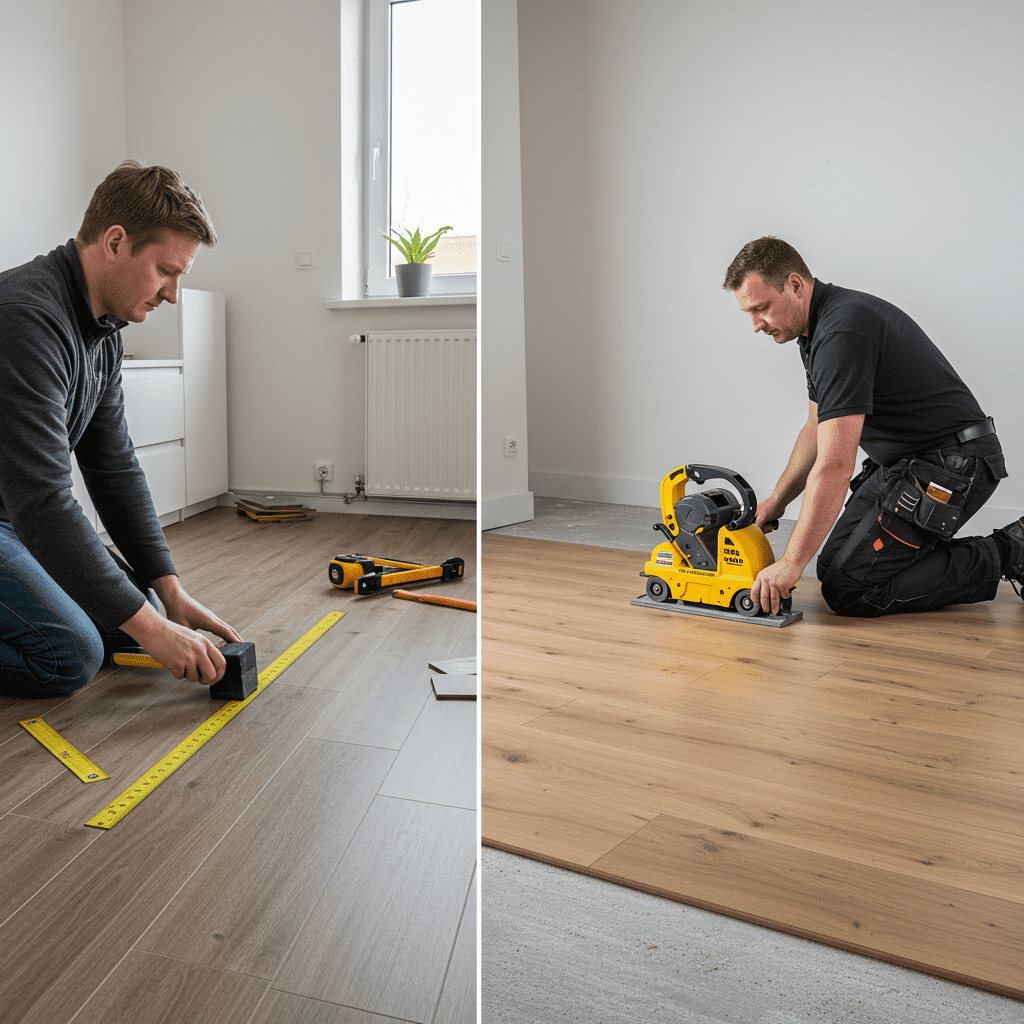
When it comes to installing modern flooring options, both luxury vinyl planks and hybrid flooring provide flexibility that suits various setup preferences:
Luxury vinyl planks are well-suited for DIY installation, thanks to their click-and-lock or peel-and-stick systems. Beginners can often handle small projects without professional support, making this option cost-friendly for home renovation materials on a budget.
Hybrid flooring typically requires professional installation, as its rigid core demands precise setup to ensure uniformity and waterproof functionality. While the upfront cost may be higher, professional installation ensures long-term durability and eliminates errors.
Cleaning and Care Techniques
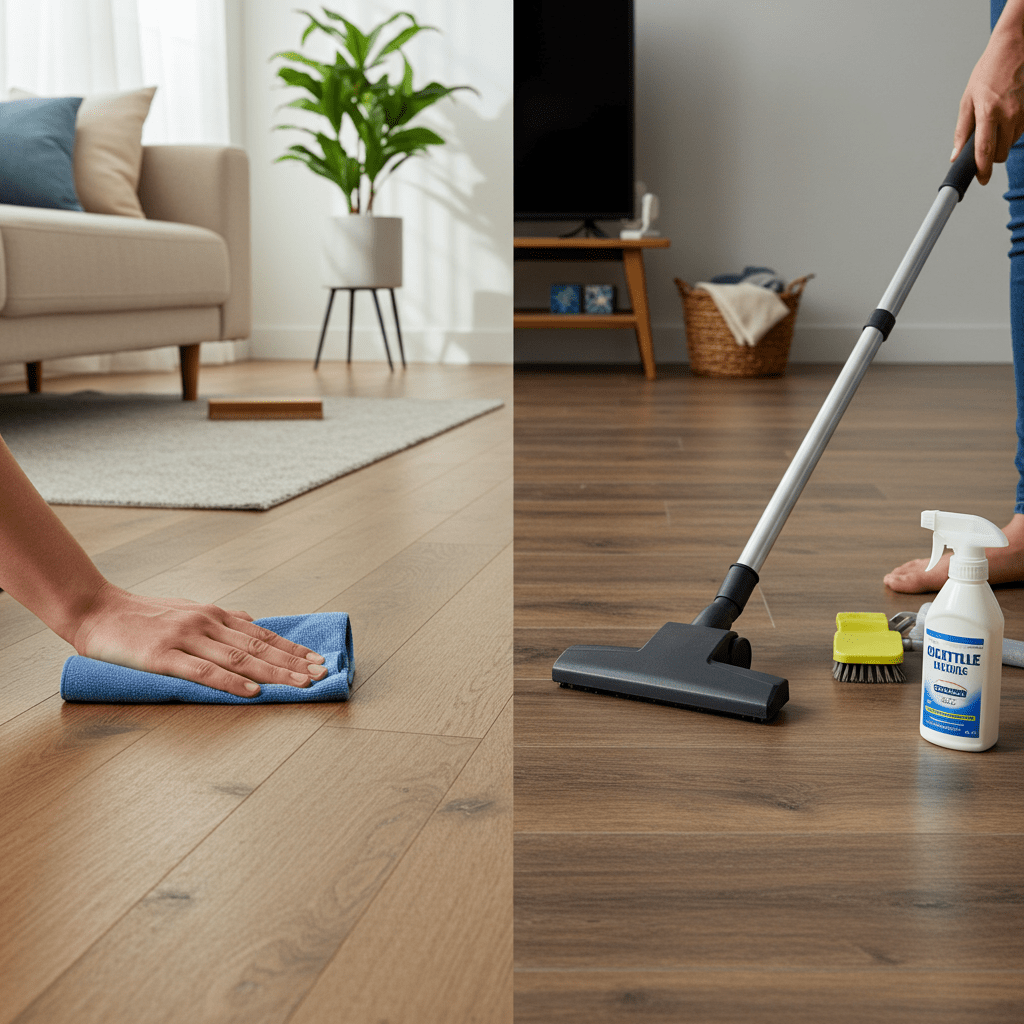
Maintaining durable floor solutions like hybrid or vinyl is straightforward with just a few essential cleaning tips:
Hybrid flooring:
- Use damp microfiber cloths and avoid abrasive cleaning tools.
- Ensure spills are wiped promptly since dirt buildup can dull textures over time.
Luxury vinyl planks:
- Sweep or vacuum regularly to remove debris.
- Use mild floor cleaners to protect the embossed textures and finish.
Both floors are highly resistant to stains, drastically reducing the need for heavy-duty cleaning tools.
Repair and Replacement Ease
Repair flexibility differs between the two flooring types:
Luxury vinyl planks:
Individual planks are easy to replace, making repairs simple and hassle-free. If a plank is damaged, it can often be swapped without affecting surrounding areas.
Hybrid flooring:
Repairs are slightly more complex due to the rigid core and seamless installation method. However, its enhanced durability ensures fewer incidents requiring repairs over time.
For modern flooring options that prioritize low-maintenance longevity, hybrid flooring tends to outlast most alternatives, while vinyl’s customization potential ensures you can replace damaged sections with ease.
Maintenance Tips (Short and Sweet)
- Use furniture pads to prevent dents and marks over time.
- Sweep floors regularly to avoid grit scratching the surface.
- Address spills quickly for both hybrid and vinyl options to avoid stains.
- For lasting appeal, follow manufacturer-recommended cleaning products.
Conclusion
In the evolving landscape of home design, selecting between hybrid flooring and vinyl planks is a nuanced decision that extends beyond mere aesthetics. Both options offer remarkable benefits, with hybrid floors providing superior durability, enhanced structural integrity, and premium design versatility, while vinyl planks present a cost-effective, water-resistant solution for budget-conscious homeowners.
Your ultimate choice should harmonize with your specific lifestyle needs, considering factors like long-term performance, maintenance requirements, aesthetic preferences, and financial investment.
By carefully weighing the unique characteristics of each flooring type such as water resistance, wear layer quality, installation complexity, and design flexibility you can transform your living space into a functional, stylish environment that reflects your personal taste and practical requirements.
FAQs
Are hybrid floors more expensive than vinyl planks?
Typically, hybrid floors have a slightly higher upfront cost but offer better long-term durability.
Can hybrid or vinyl floors be installed in bathrooms?
Yes, both are water-resistant, making them excellent choices for moisture-prone areas.
How long do hybrid and vinyl floors typically last?
With proper maintenance, both can last 10-25 years depending on quality and usage.
Do these floors reduce noise?
Both offer sound-dampening qualities, with hybrid floors generally providing better acoustic performance.
Can I install these floors over existing flooring?
Most can be installed as floating floors, but proper subfloor preparation is crucial.

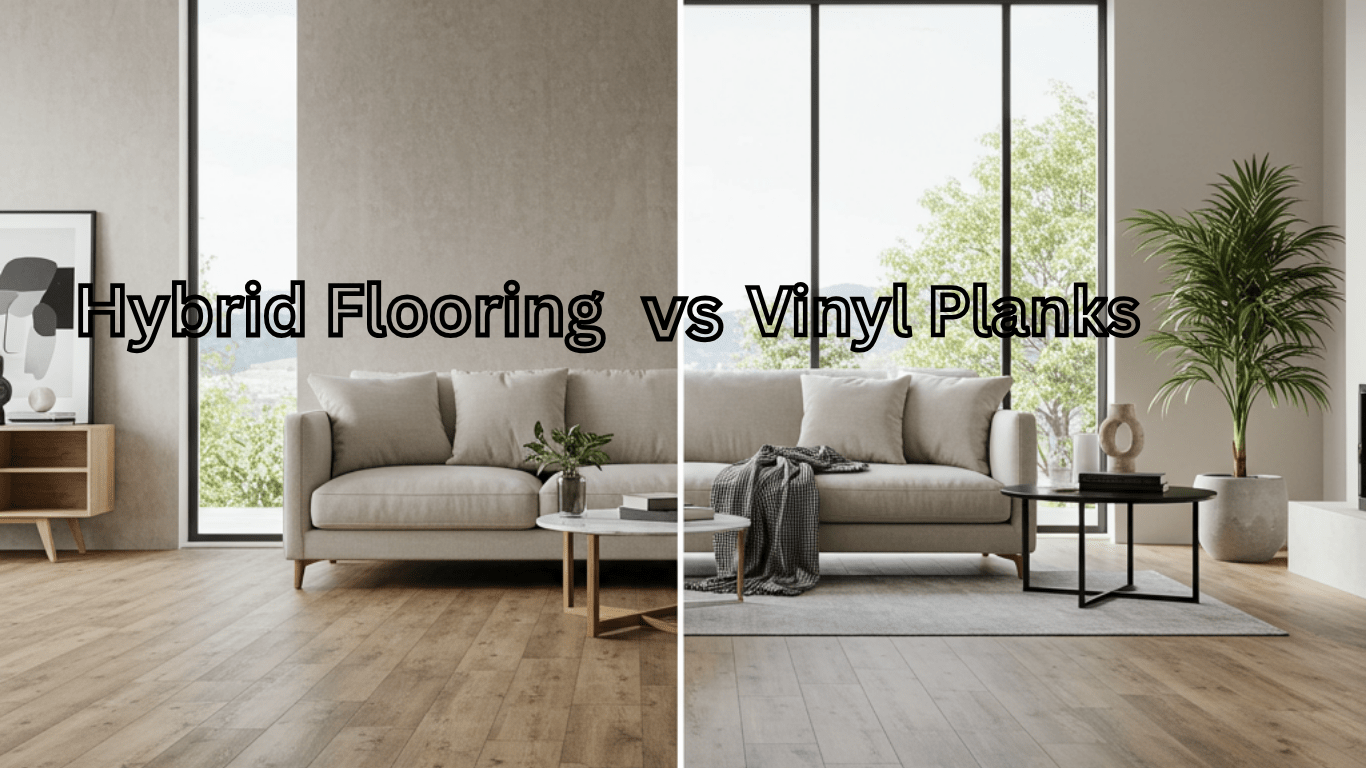
1 thought on “Hybrid Flooring vs Vinyl Planks: Which Flooring Champion Wins Your Home?”